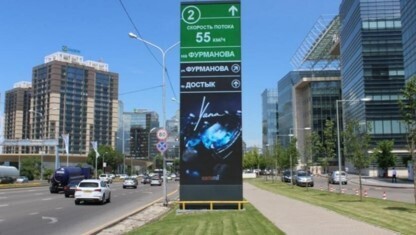
CSR Founder: 95% of job opportunities are linked to human capabilities to utilize technology
Hassan Moustafa, Chairman of the Egypt Business Solutions Summit and Founder of CSR Egypt, said ...

Kazakhstan’s Almaty has been taking key measures to curb air pollution which affects human, animal and planetary health, with an estimated 7 million people dying prematurely from diseases caused by air pollution.
Almaty is planning to plant 250,000 trees this year — to reach a total of one million new trees by 2022.
The city is also putting 400 gas buses, and 10 electric ones, on the road, and has expanded its bicycle lane network to reach 110km in length, with plans to reach 300km.
Upon the mayor’s initiative, parts of the city will be closed off to cars on weekends.
Also, Almaty is now looking at modernizing its thermal power plant as the main sources of air pollution in the city are emissions from a coal power plant, intense traffic and an ageing fleet of cars.
Moreover, Almaty has installed 25 sensors, with more sensors covering five other cities in the country. The measure was prompted by a positive action taken by Pavel Plotitsyn, an IT expert from Kazakhstan, who felt the deep effect of air pollution in the city and decided to order affordable air quality monitoring devices online and installed one on his balcony.
Plotitsyn published his readings of PM2.5 particulate matter — tiny particles that can reach people’s lungs and lead to premature death — on social media.
“The numbers were really shocking,” he says. “In parts of the city, levels of PM2.5 could easily top 300μg/m3 for several consecutive days in winter”. The maximum safe limit recommended by the World Health Organisation is 25μg/m3.
Soon, friends and neighbors asked Plotitsyn for help in installing devices for their homes, with readings published on the website. When pollution levels passed safe thresholds, sensors were marked in red.
After having certified 10 of the devices for Almaty, Kazakhstan’s national hydrometeorological body, Kazhydromet, now uses the readings along with the official data it collects through the national air quality monitoring network.The service even launched an app for the public, which includes findings from the citizen-led network and displays information on the effects of air pollution on human health.
Together with Kazhydromet data sourced from its 16 state-owned monitoring stations across the city, data collected from the citizens’ devices now feeds into 49 LED screens set up across Almaty by the mayor, Bakytzhan Sagintayev, in June. The screens display real-time levels of PM 2.5, sulfur dioxide, nitrogen dioxide, nitrogen oxide, carbon monoxide, and phenol.
“Air quality monitoring data is being shown on LED screens across Almaty. Data from sensors located in different parts of the city is updated and processed by Kazhydromet. This project will increase Almaty residents’ awareness of the quality of their urban environment,” says Mr Sagintayev.
Hassan Moustafa, Chairman of the Egypt Business Solutions Summit and Founder of CSR Egypt, said ...
Country Director Egypt Cluster Lead for North Africa at British Council Mark Howard said 10% ...
Dr. Dalia El Hawary, Deputy CEO of the General Authority for Investment and Free Zones ...


اترك تعليقا